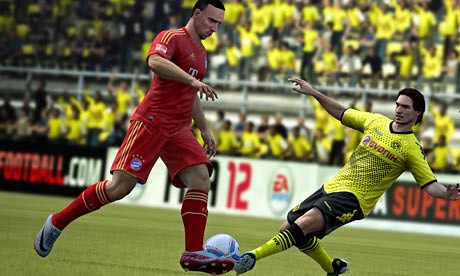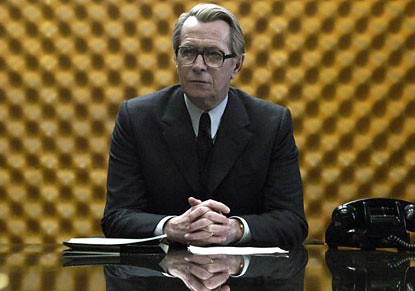Saturday, 22 October 2011
Developed by EA Canada
Published by Electronic Arts
Genre Sports
Platform Xbox 360, PS3, PC, OSX, Wii
After a few years of doing this, the annual FIFA updates inevitably seem to start blending together. This is not necessarily a bad thing as it allows me to half-ass my reviews and get back to more important things. However, this year EA Sports have decided to delight millions of fans, and mildly inconvenience me, by bringing about the biggest revolution that FIFA games have seen in a generation.
I speak, of course, of tactical defending. It's no secret that defending has always been the weakest area in FIFA; the timing is imprecise, the AI is terrible, and close friendships have ended over arguing who has to sit back and defend. But this year's update looks to change all that.
Positioning is now the key element to defending in this game, and much of the process involves applying pressure to defenders and then making the correctly timed tackle, process which seems much smoother this year than it has in the past. This new mechanic is buoyed by the all new physical collision engine which aims to add yet further realism to the art of defending. When it works, it works very well, and yet I can't help but feel as though EA are barking up the wrong tree.
You see, it doesn't work all the time. Even aside from the steep learning curve, the fact remains that by far the biggest issue with defending in the past has been the dreadful AI, and this has been the case for a number of years. So for their big defensive revolution to leave this aspect completely untouched is bizarre to say the least, and if anything the more cerebral defending in this game only serves to highlight these inadequacies.
As for the shiny new physics engine, don't get me started. People laughed at me for being skeptical when it was first announced, but anyone who has played FIFA and seen the general patchiness of EA Sports' recent attempts at animation and "realism" should have seen this coming, or this. You see, EA Sports has a habit for trying to be far too clever and overdoing it, which is why they took the concept of referees getting decisions occasionally wrong out of the game. The sad thing is that these comedy issues are not the rare glitch, they are incredibly common, I would be surprised if you can get through more than one or two matches without seeing a few slapstick moments like this.
However, it is a valiant, if misguided attempt at fixing the defensive side of the game, and aside from these issues, the gameplay is pretty damn good. In almost every other way the football on offer here has been honed and improved from last year's iteration and the attacking play feels incredibly satisfying and versatile. In the old days it would often be the case that all goals would end up being scored in the same way, but now it really is a more varied affair, and passing the ball through the defense, putting crosses in, shooting from range are all perfectly viable solutions.
The biggest issue with the game for me is more a case of design. Once upon a time there was a game called FIFA 98, which incredibly included all the domestic football content, the whole world cup from qualification to final, and a series of scenarios or "challenges" which could be played through to keep things from getting stale. Since then, however, it seems that the actual content of the game decreases more and more every year.
In FIFA 12, the challenges from previous iterations are gone, replaced with a periodic online challenge which can be played if and when the developers come up with one, so on the day of purchase there was only one challenge I could play, as opposed to literally dozens that came with the old FIFA.
Of greater concern, however, is the new career mode. EA Sports seems to have bizarrely decided that it would be best to combine the regular career and the be-a-pro mode into one single feature. The effect of this is that be-a-pro career mode has essentially been removed from the game. In FIFA 11 this gameplay mode would start you off as a youngster in the reserves, and then let you play your way into the first team and even the national side. Well in this year's edition none of that is true, there is no 'narrative' so to speak, you just start in the senior team and there is no career progression and no international call ups. Basically, the be-a-pro career mode is now exactly the same as the regular mode, except you control one player instead of an entire team. A big step backwards then.
So we find ourselves in a familiar position here. FIFA is undoubtedly the strongest football game on the market right now, but it is still so riddled with gaping flaws and astonishingly amateurish design choices that one really wishes Pro-Evo would step up their game a bit to apply greater pressure on EA.
Loves:
Defending is... slightly better
Attacking side of the game still a delight
Looks beautiful
Hates:
Overcooked physics engine (but funny)
Dire lack of be-a-pro gameplay features
Saturday, 8 October 2011
Directed by Tomas Alfredson
Written by Bridget O'Connor, Peter Straughan, John le Carré (novel)
Produced by by Tim Bevan, Eric Fellner, Robyn Slovo
Starring Gary Oldman, Colin Firth, Tom Hardy, Benedict Cumberbatch
Running time 127 minutes
An all star cast and crew team up in an attempt to adapt le Carré's classic novel to the cinema.
Skepticism was rife when a cinematic adaption of Tinker Tailor was announced. After all, the novel is a celebrated and layered tale of espionage, which up til now has only been successfully adapted into the BBC's seminal seven part miniseries. Fitting the entire piece into a two hour film was always going to be a tall order.
For their part, an impressive array of talent has been assembled for the project. Director Tomas Alfredson is one of the big up and comers in the cinema world following the critical acclaim lavished upon Let the Right One In, while the cast features such luminaries as Gary Oldman, Colin Firth, Benedict Cumberbatch, Tom Hardy, John Hurt and Mark Strong. It all makes for one of the more impressive ensembles in recent years, with a good mix between experienced old hands and hotly tipped newcomers.
It is no small praise then that this crew damn near succeeds in their efforts. The end result is an entertaining and cerebral two hours, one which appears almost flawless from a technical standpoint. Alfredson more than lives up to his billing, crafting a visually striking and generally well articulated film of some style. A great deal of credit must go to both him and the scriptwriters who have done about as good a job as can reasonably be expected in fitting the story into such a short narrative running time. Tinker Tailor is a satisfying and complex story regardless of format, and fans of the genre will find much to enjoy here.
Additional kudos must go to the actors involved. It is inevitable that they will be unfairly compared with those that have portrayed these characters in the past, notably the late Sir Alec Guinness, but they do themselves a great service, standing tall alongside their esteemed forbears.
Gary Oldman delivers one of the strongest performances of his career, a fine-etched tableau of a world weary being sleeping under well trained exterior. Familiar faces like Colin Firth and John Hurt also bring their typical level of quality to proceedings, but special note should be afforded to relative new boys Tom Hardy (who viewers will recognise from Inception) and Benedict Cumberbatch (who will be familiar to fans of the recent BBC adaption of Sherlock Holmes, or to any regular theatre patrons in London), both of whom have seen their stars rise considerably in the last few years and will see it take off still further here.
Yet despite this, Tinker Tailor still falls short of the standard set by its other iterations. While this may be a highly entertaining and well made spy thriller, it consistently falls flat when addressing some of the meatier contexts of the original plot, and at key moments. A perfect example is the final climactic scene, which sadly finds itself lacking in any real suspense or sense of danger. The big reveal of the double agent traitor thus feels disappointingly indifferent; what was supposed to be a wrenching and deep conflict of friendship and betrayal ends up with a complete lack of emotional impact.
So what went wrong? Ultimately it seems inarguable that two hours is just not long enough to fully appreciate the details of this story. The ending lacks tension because the stakes have not been well established, and the pacing inconsistent. The character drama lacks impact because the characters have not been fleshed out with any substance, and their relationships have not been explored in any real sense. Colin Firth in particular, for what is a pretty central role, has fewer lines than I can count on my fingers up until the final scene, and as far as I can remember doesn't share any lines whatsoever with Mark Strong's character, which is intended to be one of the deeper and more meaningful relationships in this story. These characters, simply, do not have anywhere near enough time to develop sufficiently.
This movie feels like an abridged version of Tinker Tailor, a bare-bones outline of events, offering newcomers to the story only a touch more emotional depth than a wikipedia plot summary. However, it would be foolish to only criticise this film for what it isn't, rather than appreciate what it is. This is not a novel, nor is it a miniseries, but as a film in its own right it is a fine piece of work, albeit one that finds itself oddly lacking in bite.
Just to be clear, this film makes a valiant attempt at adapting the classic novel. The production and cast are superb, and one can't help but be impressed at how close they have come to condensing everything to film length. In the end there simply is not enough time to devote more than the most superficial of attention to the characters and relationships, which is where the real meat of this tale lies.
Loves:
Quality of film making
Fine acting
Satisfying and intriguing classic plot
Hates:
Too short to flesh out character drama
Sometimes lacking in suspense
Often lacking in dramatic impact



